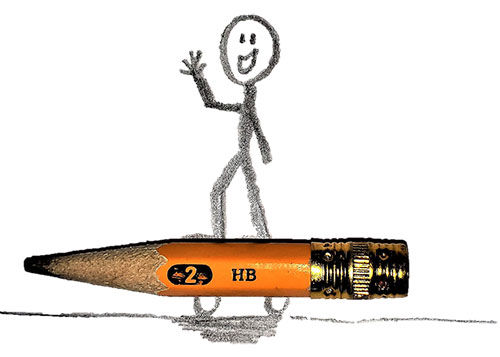College School Supplies: 5 Things to Consider

As you begin to prepare for the fall semester at Concordia University Texas, you will likely begin searching for school supplies. Here are some helpful tips to help you as you decide which school supplies to purchase.
Number 1: The Right Sticky Note for You
Sticky notes (aka Post-it Notes), are useful for jotting down reminders where you study, marking an important page in your textbook and much more. With a variety of shapes, sizes and colors, there are sticky notes for all of your needs.
Did you know that the use of a sticky note began with a hymnal?
In 1968, Dr. Spencer Silver, who was serving as a chemist at 3M, accidentally developed a weak adhesive that was sticky but removable. Although it was inventive, Silver and 3M couldn't think of a way to leverage it into a product.
They were stuck — but not permanently.
One of Silver's colleagues, Art Fry, discovered an ideal use. A member of his church's choir, Fry constantly battled to keep his bookmarks from falling out of his hymnal. He tried Silver's adhesive on his bookmarks, and it worked perfectly. The bookmark stuck in place, but it could easily be removed without damaging the pages. Fry advised Silver to apply his invention to small notes, and by 1980, the Post-it Note became a national success.
Number 2: Pencil (Get it?!)
Is a wooden pencil or a mechanical pencil better? It depends on your personal preference.
Both types of pencils accomplish the same thing. A wooden pencil, such as the classing yellow No. 2 pencil, offers a classic writing experience. However, it requires you to carry a sharpener and continually sharpen it. Plus, you will eventually run out of pencil.
 A mechanical pencil offers many benefits. It lasts much longer, allows you to keep
the "lead" (graphite) at a consistent length and doesn't require sharpening. However,
you do have to remember to keep lead refills with you and ensure that they are the
right size for your pencil.
A mechanical pencil offers many benefits. It lasts much longer, allows you to keep
the "lead" (graphite) at a consistent length and doesn't require sharpening. However,
you do have to remember to keep lead refills with you and ensure that they are the
right size for your pencil.
Number 3: Writing Between the Lines
There is an important difference between wide-ruled paper and college-ruled paper.
The gaps between each line on a wide-ruled page are larger, giving students more space to write. Because the gaps are wider, there are fewer lines on wide-ruled paper. College-ruled paper has smaller gaps, allowing for more content.
If you tend to write larger, consider wide-ruled. If you tend to write smaller, college-ruled paper will work best.
Number 4: Plethora of Pens
In addition to a range of styles and colors, there are different types of pens from which you can choose.
Three of the most common pens — ballpoint, rollerball and gel — all operate the same way; ink is distributed onto paper through a small, rotating ball at the tip of the pen. The primary difference between the three is the type of ink used:
- Ballpoint pens use oil-based ink, which dries the fastest (reducing smudging) but requires more pressure when writing.
- Rollerball pens use water-based ink, which allows much more ink onto the paper. While its ink takes longer to dry and can bleed through paper, a rollerball pen is easier to write with and produces vivid lines.
- Gel pens are a hybrid of the first two types of pens. Gel pens use water-based gel for the ink, so they don't dry as quickly as ballpoint pens, and they tend to skip more often. However, gel pens offer the widest range of colors, a smooth writing experience and the smallest line widths.
A felt pen is essentially a type of marker, funneling ink onto the paper via a felt tip. While felt pens offer a selection of colors and well-defined lines, they can easily dry out (rendering the pen useless) and can bleed through paper.
Number 5: Stapler
Picture this: It's five minutes before class starts, and you've just printed out your paper at the library. It's a great paper, and your citations are perfect. But there's just one problem: you need to staple your papers together, and the library's stapler is completely out of staples.
It may seem like having a stapler is useless, but for the rare occasions when you turn in a paper to your professor, you'll be glad you have one. You don't have to go around toting a full-size stapler either; look for a mini stapler.
